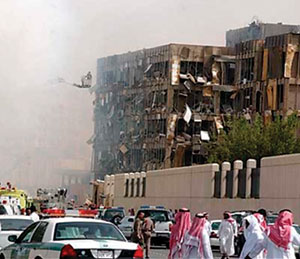|
Vol. 225 No. 6 |

|
 |
| DR. A. F. ALHAJJI, CONTRIBUTING EDITOR, MIDDLE EAST |
Will militants' attacks affect foreign investment plans in Saudi Arabia? Foreign oil companies continue to invest in the most politically troubled oil-producing countries, such as Colombia, Sudan, Yemen and Algeria.
Nevertheless, one must consider whether recent militant attacks in Riyadh and Yanbu will reduce foreign investment in Saudi Arabia. An immediate, convenient answer might be “yes,” but a careful look at various oil-producing countries that have suffered (and are still suffering) instability and violence indicates that foreign investment has not declined. Instead, it has increased, so why should Saudi Arabia be any different, when compared to the following examples?
Colombia. Civil war still rages in Colombia, where rebel groups control 40% of the country. The Cano Limón pipeline has been bombed more than 900 times since it was built in 1985. Colombian rebels have repeatedly blown up oil and gas installations, electricity transmission lines, trains and train stations. They have kidnapped foreign oil workers and even killed some of them.
During 2002, more than 3,500 Colombians died at the hands of warring parties. During the same year, rebels kid-napped more than 2,000 people, including former presidential candidate Ingrid Betancourt. Last year, rebels kidnapped and shot a former defense minister and a state governor.
Despite all the terror, Occidental, ExxonMobil, BP and Repsol-YPF have not left this oil-rich nation. Instead, they have increased their investments, and additional firms are signing contracts with state oil company Ecopetrol. Since 2002, signers have included Chile's Sipetrol, Brazil's Petrobrás, Russia's LUKoil and Canada's Nexen. Last January, ExxonMobil and Petrobrás signed a deal to explore for oil offshore Colombia. Indeed, Colombia's direct foreign investment during 2002 was more than double 1995's level.
According to the US Department of State, the world's highest number of terrorist attacks during 2001 happened in Latin America (201), followed by Asia (68), Africa (33) and the Middle East (29). Most of the Latin American attacks took place in Colombia. Last year, 56% (46 incidents) of all attacks against US assets took place in Latin America, while only 13% (11 incidents) occurred in the Middle East. Despite Colombia's dire situation, and the fact that its oil reserves are less than 1% of Saudi's reserves, foreign investment continues to increase.
Algeria. A civil war began in this North African country during December 1991, after officials annulled a free election that the Islamic movement won with 80% of the vote. Despite continued violence that has claimed more than 60,000 lives, Algeria's foreign investment has increased more than 13-fold since 1991, making it attractive to the global oil and gas industry. Algeria has become the world's second-largest gas exporter after Russia, and the country has increased productive capacity by more than 500,000 bopd.
 |
Terrorist bombings, like this one in Riyadh on April 21, 2004, do not necessarily deter E&P investment in Saudi Arabia any more than in other oil-producing countries prone to violence.
|
|
Algeria's situation, as in Colombia, is complex. In recent years, Algeria has suffered from devastating drought (2000), floods (2001) and an earthquake (2003) that claimed thousands of lives. The Berbers, a large minority, demonstrated in the streets and pressured the government tremendously to improve their living conditions, offer them jobs and give them more control of their localities. Despite these problems, foreign investment has continued to increase.
It should be noted that Algerian oil reserves are not as abundant as those of Saudi Arabia, equaling only about 4% of the latter's holdings. However, Algerian gas reserves are 65% of Saudi's gas figure.
Other examples. Myanmar has suffered from civil war, floods, droughts and economic sanctions, yet Unocal remains. Other firms from France, Thailand, South Korea and India have signed E&P deals in recent years. In fact, South Korea's Daewoo International discovered a gas field in northwestern Myanmar, in the Rakhine basin.
Sudan has suffered from civil war, political chaos, drought, famine and economic sanctions. Thousands of people have been killed, and others have lost their homes. Yet, foreign investment keeps pouring in. Sudan's genocidal violence did not force some companies to leave. Rather, their departures were forced by public and political pressure in the US and Canada. They were quickly replaced by other international companies, despite the violence!
Limited space prevents describing similar situations in Russia, Yemen, Kazakhstan and Azerbaijan. All of these oil producers have suffered from political instability, civil war, regime change, mass killings, car bombs, explosions and/or foreign worker kidnappings. Yet, foreign investment continues to increase.
It is rather naive to compare Saudi Arabia's situation to the countries above, although these extreme examples do shed light on the very complex problem of behavior of foreign investment in natural resources. Furthermore, despite recent bombings, Saudi Arabia is stable compared to the countries mentioned above. Foreign oil companies that pour money into countries consumed with violence should not be deterred in Saudi Arabia.
One thing is certain – observers should distinguish between necessarily long-term investment in natural resources and such short-term investments as certain stocks, commodities and currency speculation. Upstream operations are long-term investments that require patience, especially in countries with special circumstances. Investors who are looking for a quick profit (or short-term profit) ought not get in the game. 
Dr. A. F. Alhajji is an associate professor of economics in the College of Business Administration at Ohio Northern University in Ada, Ohio, specializing in international and energy economics. Previously, he was an award-winning, visiting professor of economics at Colorado School of Mines. He is a regular contributor to this column.
|







